A major mining project in southeast Yukon, and whether Kaska Nation was properly consulted on it, was back in court last week — this time, in front of the Yukon Court of Appeal.
Lawyers representing Kaska Nation maintained Thursday that proper consultation did not happen on BMC Minerals’ Kudz Ze Kayah project and that a ruling from a lower court that found otherwise should be tossed. Lawyers for the attorney general of Canada, the Yukon government and the company, meanwhile, argued Friday that Kaska Nation’s appeal was without merit.
At the centre of the case is a 2022 decision by Canada and the Yukon approving Kudz Ze Kayah to move into the regulatory phase — essentially, allowing BMC Minerals to apply for water and quartz mining licences — following a lengthy socio-economic assessment.
Ross River Dena Council, on behalf of Kaska Nation, filed a legal petition that same year asking for a judicial review.
The Kudz Ze Kayah grounds, located approximately 115 kilometres southeast of Ross River, Yukon, are on Kaska traditional territory in an area community members described in court documents as sacred and a “bread basket,” providing key habitat for the Finlayson caribou herd, berries, medicinal plants and other wildlife.
Yukon Supreme Court Chief Justice Suzanne Duncan ruled this year that the Crown had largely met its duty to consult, except in one instance — Ross River Dena Council and Liard First Nation submitted a 26-page letter on June 14, 2022, outlining a number of concerns with the project, one day before Canada and the Yukon issued the approval for Kudz Ze Kayah to move ahead.
Duncan ordered Canada and the Yukon to properly consult the First Nations on the letter and re-issue their decision.
Ruling flawed, Kaska Nation lawyer argues
Lawyer Mark Youden, representing Kaska Nation, argued in appeal court Thursday that Duncan’s ruling contained three major flaws — not acknowledging the lack of consultation on Kudz Ze Kayah’s economic feasibility, characterizing Kaska Nation as being difficult during the consultation process, and putting too many restrictions on how the consultation on the June 14 letter could take place.
While Duncan found that economic feasibility wasn’t a factor that could be considered under the Yukon Environmental and Socio-economic Assessment Act (YESAA), Youden said it was hard to understand how it didn’t count as a “socio-economic effect.”
Even if economic feasibility wasn’t captured by YESAA, Youden argued that the Crown was obligated to “fill in any gaps” when it came to deep and meaningful consultation, particularly because the issue was repeatedly identified by Kaska First Nations as a major concern. He also argued that pushing conversations about feasibility to the regulatory phase didn’t absolve the Crown of its responsibilities.
Youden also took issue with Duncan’s finding that Kaska Nation hadn’t met its “reciprocal duty” and “frustrated” the consultation process by not replying to correspondence or agreeing to meetings in a timely manner. While Duncan acknowledged the First Nations were dealing with severe capacity issues, Youden argued the ruling failed to properly link that to the delays and instead unfairly concluded that the Kaska were being difficult.
Finally, Youden argued the consultation Duncan ordered on the June 14 letter came with too many restrictions — including when it would happen, how long it could happen for and what documents could be exchanged — to the point that it amounted to an overstep of Crown discretion. The Crown, he argued, needs flexibility to determine how best to discharge its obligation to consult.
Canada, Yukon and BMC say ruling should stand
The appeal arguments were met with stiff opposition.
Attorney general of Canada lawyer Marlaine Anderson-Lindsay, Yukon government lawyer I.H. Fraser and BMC Minerals lawyer Roy Millen all separately argued that Duncan’s ruling contained no errors and Kaska Nation was seeking outcomes outside the scope of consultation.
Consultation, all three parties said, does not mean agreeing to specific demands and besides the June 14 letter, the Crown met its obligation to listen to, acknowledge and take into account Kaska concerns.
The Crown, Anderson-Linsday argued, has discretion to structure consultation in a way that it sees most appropriate, and in this case, decided it wasn’t necessary to do economic feasibility assessment. The issue, she argued, had already been canvassed in the larger consideration of economic issues.
Canada and Yukon’s submissions at one point contradicted each other, with Anderson-Lindsay arguing that there was room for consultation on economic feasibility in the regulatory phase and Fraser stating that it played no role in determining whether a water or quartz mining licence would be awarded.
Fraser, in his submissions, said that the economic viability of a project didn’t matter to the Yukon government — instead, its focus was mitigation, and if the cost of implementing mitigation measures proved too costly, that would be “too bad” for the project proponent. He also pointed out that neither Canada nor the Yukon raised issues with the consultation conditions for the June 14 letter, even though Kaska Nation had argued that they were overly-restrictive on the Crown.
Millen, meanwhile, argued that Kaska Nation had failed to make a connection between economic feasibility and its impact on Aboriginal rights, which they argued is ultimately what consultation is about.
“Kaska don’t have a right to a profitable project,” Millen argued, later adding that because Kaska First Nations don’t have “proven title,” they don’t have a right to reject projects on their traditional territory either.
Youden took aim at that in his reply.
“This is not a veto case,” he said.
The appeal judges reserved their decision. They did not provide a date for when they would deliver it.
In the meantime, BMC Minerals is once again working on getting licences in place for Kudz Ze Kayah. Canada and the Yukon completed the court-ordered consultation on the June 14 letter earlier this year before re-issuing its approval for the project to move into the regulatory phase with amended conditions.



